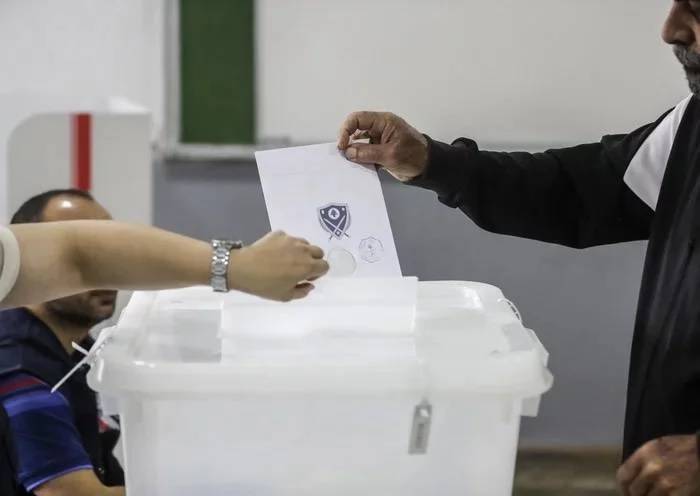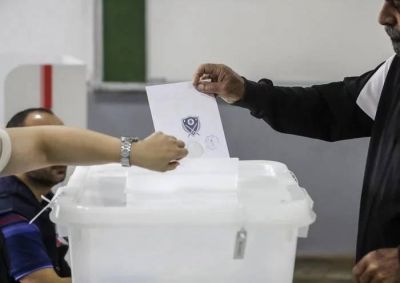
A Lebanese man votes during the 2018 legislative elections. (Credit: Joseph Eid/AFP)
Since preparations for the 2022 legislative elections began, the question of the diaspora voters has sparked several debates. Specifically, civil society has been fighting on two fronts: first, to ensure that Lebanese abroad get to cast their ballot alongside Lebanese in the country for all the 128 MPs in Parliament, instead of being allotted only six separate seats as stipulated by the 2017 law, and second, to prevent their votes from being canceled out.
On Tuesday, Parliament approved without a hitch an amendment to the electoral law that allows expats to vote for all 128 MPs, based on voters’ civil registration.
Back in 2018, Lebanese emigrants voted for parliamentary seats as part of the country’s 15 constituencies. Before Parliament amended the law, expats would have voted in the 2022 elections for six seats, one allocated to each a Sunni, a Shiite, a Druze, a Maronite, a Greek Catholic and a Greek Orthodox.
Representatives from the parties campaigning for the diaspora to vote according to the same logic as in 2018, the Progressive Socialist Party and the Lebanese Forces, say they are satisfied with the change.
“From the very beginning, most MPs agreed on the need to allow expats to have their say in the upcoming legislative elections,” MP Bilal Abdallah (PSP/Chouf) says.
“The Lebanese who first began to emigrate in 1975 still have ties to Lebanon, and their opinion counts. We do not understand this six seats heresy or how it was introduced in the 2017 version of the electoral law. It has no value,” he said.
An LF official, who spoke on condition of anonymity, told L’Orient-Le Jour, “A decision had to have been made about Lebanese voters overseas” to justify Parliament’s swift decision to amend the law.
“The two Shiite parties, which were initially against this vote, have realized that the six-seat formula would prevent them from campaigning abroad, because Hezbollah is classified as a terrorist organization in several countries. Therefore, the two Shiite parties approved the amendment, whereby the diaspora voters could participate in the elections as they did in 2018, knowing that the Shiite voters [among the diaspora] were not numerous,” the source added.
Ali Murad, a public law lecturer and a legal adviser at the civic organization Kulluna Irada (“We Are All Determined”), said Hezbollah and Amal, which were reluctant to endorse the amendment, ended up approving the decision to avoid having any problems arise from the six-seat voting system.
“This way, the two Shiite parties will no longer have to worry about any inconveniences of having their potential candidates travel abroad to campaign,” Murad said.
He added, “In the end, Amal and Hezbollah do not see a real threat coming out of the expats’ vote, because the large portion of the diaspora will continue to vote for the people in power now.”
Free Patriotic Movement to appeal
While Parliament’s decision was welcomed by diaspora voters sympathetic to the October 2019 uprising, with most Lebanese expats eager to bring about change inside their country, the Free Patriotic Movement criticized it and voted it down. A fervent defender of the six-seat formula, the FPM intends to make an appeal against the decision.
Speaking with L’Orient-Le Jour, an FPM official confirmed that their party seeks to challenge the electoral law amendment “on the basis of a provision of the Constitution stipulating that what has already been approved through a law cannot be changed.”
“The six-seat formula for the diaspora voters will allow the Lebanese living overseas not only to vote but also to run as candidates,” the source said. The source added that the amendment is not the worst thing threatening fair elections, but moving up the election date could be even more dangerous.
Meanwhile, Abdallah said it was unlikely to rescind the electoral law amendment as it was already passed but underlined the seriousness of a potential FPM appeal.
“The only danger to the expatriate vote is the insistence of some parties on launching an appeal before the Constitutional Council to reinstate the six-seat system for the Lebanese expats. This could torpedo voting abroad. I hope that nobody intends to cancel the emigrants’ vote,” he said.
This article was originally published in French in L’Orient-Le Jour. Translation by Sahar Ghoussoub.
